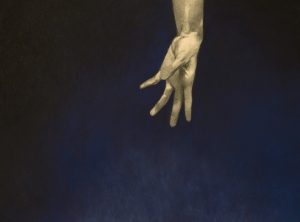
Self-Eclipse
Now that you are gone, my gaze
circles the room
and then repeats itself
like rings in an ancient tree.
My arms
assume the shape
of the place you once filled.
They open wide
and then close, out of time,
like the mouths of the mute
hearing voices flooded with song.
I peer into your closets and drawers,
though I know they’re all empty.
I stare at the mirror down the hall, but
it looks back at me, detached,
like a fellow traveler on a train to whom
I am simply one less open seat.
I am in my own way,
and even my shadow
has made other plans
that don’t include me.
John Middlebrook
Review by Massimo Fantuzzi
A dance of ghosts, out of time with each other and belonging to incompatible realities. Separation occurred, and we sense the crowbar still at work, prying in every corner, distancing every I from every your, every my from whatever was you.
What have we been for each other? But there’s no “we” nor “us”: not a single one of those in this poem. Have we ever been more than just “one less open seat” in front of each other?
However downcast and close is the air we breathe here and however eclipsed, filled with absence we might feel, I’d like to think of this composition as a message of awakening and authenticity:
“Never before in recent days, I had sensed what it meant to exist” (Sartre, Nausea).
Review by Calvin Jolley
“Self-Eclipse” is a fine poem, minus the simile in the second stanza.
like the mouths of the mute
hearing voices flooded with song.
Middlebrook brings it prior and picks it up thereafter. The poem is short of amazing because “voices flooded with song” is not.
Review by Jared Pearce
While it is unclear if the speaker’s self-absorption (too much? Maybe?) is the cause of being left by the you who left him, it is clear that the speaker’s consideration of his lone self is lots of fun to review: the mouthing mute, the train traveler, the shadow. While the speaker reviews his lonesomeness it is tempting to think that the reader has been allowed to understand why the you left. Then again, we only see—as if the light were dimmed as during an eclipse—part of the scene, part of the response, part of what has happened, of what is happening, and we aren’t sure what will happen when the light gets back to full strength.
Review by Sophia Vesely
Middlebrook does a wonderful job uncovering the paradox that the absence of another can yield the loss of oneself. And although the poem is filled with feelings of loss, detachment, and hopelessness in the face of a missing loved one, the title “Self Eclipse” (a very unique concept) brings a profound sense of optimism, for eclipses never last forever. As with a solar eclipse, the daylight eventually returns and the Moon continues to orbit.
